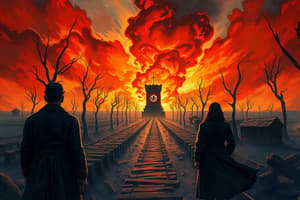Podcast
Questions and Answers
What year did the Nazis come to power?
What year did the Nazis come to power?
1933
How did WW1 help gain support from the German people?
How did WW1 help gain support from the German people?
They were humiliated after their defeat, their territory was lessened, they had to pay heavy reparations, no jobs, there was a worldwide depression and distrust to the government.
What was the name of the Nazi state?
What was the name of the Nazi state?
German Reich
What effect did the belief that Germany was the superior race have on domestic policy with regard to women in German society?
What effect did the belief that Germany was the superior race have on domestic policy with regard to women in German society?
Which races were considered inferior to the so-called Aryan race?
Which races were considered inferior to the so-called Aryan race?
What are some of the laws enacted in Hitler's regime that were restrictive of the rights of Jewish citizens?
What are some of the laws enacted in Hitler's regime that were restrictive of the rights of Jewish citizens?
How did the Third Reich identify someone as Jewish by blood?
How did the Third Reich identify someone as Jewish by blood?
When was Kristallnacht and what happened on that night?
When was Kristallnacht and what happened on that night?
What was the original purpose of concentration camps?
What was the original purpose of concentration camps?
Besides Jews and Gypsies, what other groups were targeted by the Nazis for extermination?
Besides Jews and Gypsies, what other groups were targeted by the Nazis for extermination?
What is the Holocaust and why does it have this name?
What is the Holocaust and why does it have this name?
When the Jews arrived at the camps, which groups of people were targeted for immediate extermination?
When the Jews arrived at the camps, which groups of people were targeted for immediate extermination?
How many Jews were killed in the Holocaust?
How many Jews were killed in the Holocaust?
What were three main ways Jews were killed during the Holocaust?
What were three main ways Jews were killed during the Holocaust?
How did the Nazis try to avoid detection of their crimes in the last months of the war?
How did the Nazis try to avoid detection of their crimes in the last months of the war?
How did Jews react to the Civil Rights Movement?
How did Jews react to the Civil Rights Movement?
What is genocide?
What is genocide?
What are neo-Nazis and what are their goals?
What are neo-Nazis and what are their goals?
Why was Fritzie afraid to step on the grounds?
Why was Fritzie afraid to step on the grounds?
How had the world changed after the Holocaust?
How had the world changed after the Holocaust?
What did genocide promise?
What did genocide promise?
Why is the nighttime harder?
Why is the nighttime harder?
When did a group of neo-Nazis attempt to march through Illinois?
When did a group of neo-Nazis attempt to march through Illinois?
What changed after the protests?
What changed after the protests?
What happened in Rwanda in 1944?
What happened in Rwanda in 1944?
Study Notes
Rise of the Nazis
- Nazis came to power in 1933 amid a backdrop of post-World War I humiliation, loss of territory, heavy reparations, unemployment, a global depression, and government distrust.
Nazi State
- The Nazi regime was officially identified as the German Reich.
Domestic Policy and Women
- Belief in Aryan superiority led to increased rights for women, including voting and the expectation to have multiple children, while also encouraging them to work outside the home.
Aryan Race and Inferior Races
- Aryan races were considered superior; Jews, Slavs, Black individuals, Roma, and others with disabilities were labeled as unworthy of life.
Anti-Jewish Laws
- Jews faced numerous restrictive laws:
- Exclusion from public life and education.
- Bans on professions and making a living.
- Mandatory ID cards and wearing identification stars.
- Required to attend Jewish schools, loss of licenses/passports, and voting rights were revoked.
- Enforced curfews.
Jewish Identification
- Determining Jewish lineage included criteria like having two Jewish grandparents, being born out of wedlock, or marrying a Jewish person.
Kristallnacht
- Occurred on November 9-10, 1938, where party officials directed assaults on Jewish properties, resulting in over 7,000 businesses vandalized, approximately 2,000 arrests, and widespread destruction of synagogues.
Concentration Camps Purpose
- Initially established to imprison political opponents and intimidate leadership, concentration camps evolved into extermination camps for Jews following the outbreak of WWII.
Targeted Groups for Extermination
- In addition to Jews and Gypsies, the Nazis targeted Soviet POWs, Polish people, Russians, communists, socialists, and homosexuals.
Holocaust Overview
- The Holocaust resulted in the murder of approximately 6 million Jews, representing two-thirds of the European Jewish population.
- The term "Holocaust" means "burnt offering," referring to the cremation of victims.
- Jewish people referred to it as "Shoah," meaning catastrophe, while Nazis termed it "the Final Solution."
Immediate Extermination Targets
- Upon arrival at camps, vulnerable groups such as the elderly, handicapped individuals, pregnant women, and those unable to work were immediately targeted for extermination.
Methods of Killing
- Methods of killing included poison gas, starvation, diseases (such as typhus), and shootings, totaling around 6 million Jewish deaths.
Evasion of Detection
- To conceal their crimes in the final months of the war, Nazis destroyed gas chambers, burned incriminating documents, conducted mass executions, and relocated prisoners.
Jewish Involvement in Civil Rights
- Jewish individuals actively participated in the Civil Rights Movement due to shared experiences of oppression and hardship.
Genocide Definition
- Genocide involves the systematic killing of a large group of people, especially targeting specific ethnic groups or nations.
Neo-Nazi Movement
- Neo-Nazis aim to resurrect Nazi ideologies and regain influence following World War II.
Individual Trauma
- Individuals expressed fears about stepping on certain grounds, believing they might encounter blood from past atrocities, highlighting psychological impacts.
Post-Holocaust World Changes
- The Holocaust set a precedent for genocide on an unprecedented scale, leading to global recognition of such atrocities.
Genocide Pledge
- "Never again" became a rallying cry and a commitment against future genocides.
Nighttime Fears
- Nighttime brought constant nightmares, exacerbating the trauma experienced during the Holocaust.
Neo-Nazi March
- In 1978, a group of neo-Nazis attempted a march in Illinois, reflecting ongoing extremist movements.
Educational Reforms
- Following protests against neo-Nazi activities, Holocaust education was mandated in schools to ensure awareness and remembrance.
Rwandan Genocide
- In 1994, a genocide occurred in Rwanda, resulting in the massacre of hundreds of thousands over a span of 100 days.
Studying That Suits You
Use AI to generate personalized quizzes and flashcards to suit your learning preferences.
Description
Explore the rise of the Nazi regime in Germany, which emerged after World War I's turmoil. This quiz examines the implementation of anti-Jewish laws, ideas of Aryan superiority, and the unique roles assigned to women within the Nazi state. Test your knowledge on this crucial historical period and its lasting impacts.




